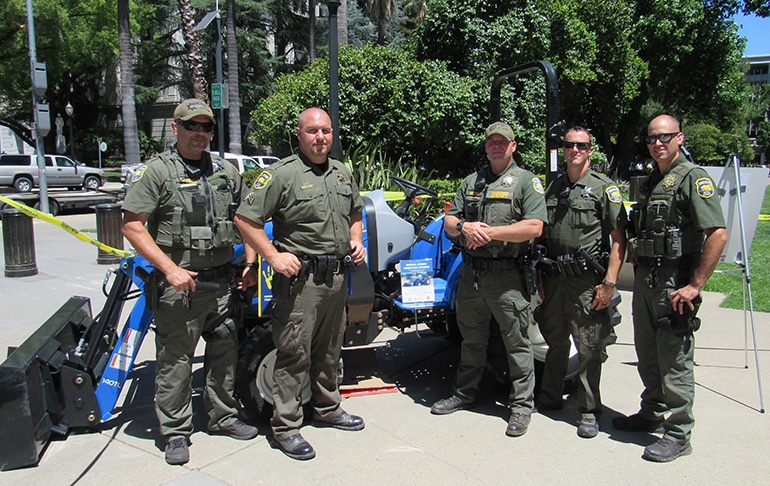
Rural crime is nothing new. As far back as can be remembered, disputes between ownership of livestock have been argued between neighboring farms and ranches. In the days of the Great Depression, landowners would often accuse others of theft if a deer or a rabbit was shot on their property, and perhaps dating back to the earliest days of farming, mischievous youth would stop along the road to grab a fresh apple or orange from a farmer’s tree.
Many stories and more than a warehouse full of movies have been based on the Old West and the days of cattle rustling, a problem that still exists in the United States today, including in California.
In more recent times, rural areas, once thought to be safe from the elevated levels of crime found in more populated areas like cities and towns, have become a target of thieves.
For many years rural residents rarely locked the doors of their homes or barns or feed storage sheds. Tractors were left standing in the field when the sun went down and were almost always in the same spot the next morning, or even the next week.
Times have changed. Farmers, including tree nut growers, have been experiencing a rise in crime, particularly for nut growers the theft of freshly harvested almonds, walnuts, pistachios, pecans and other types of high-value crops.
“Crimes on the farm have definitely been on the rise for a number of years,” California Farm Bureau Federation’s Robert Spiegel told Western Farm Press in a lengthy discussion on rural crime last week. “Farm equipment particularly is a major target of thieves. But they are stealing other items of value including agricultural products like livestock, even crops of value, including tree nuts.”
He says with the presence and pressure of organized law enforcement and even competition among criminals in urban areas, many thieves have looked to greener pastures to perform their dirty deeds and found a treasure of less-protected property and goods in more remote rural areas where fewer eyes were watching and where the level of trust ran much higher than in urban centers.
In 2016 law enforcement reports from the Central Valley indicated that an estimated $10 million in product losses were realized by California growers and processors over a single six-month period, including the theft of stolen tree nuts and other farm and ranch products. The theft of tree nuts in the Central Valley alone were estimated at $4 million that year.
Tulare County Sheriff Mike Boudreaux reported over 30 truckloads of almonds, pistachios, cashews, pecans, and walnuts had been stolen from nut growers and processors in central California that year. Spiegel said such criminal efforts generally indicates an organized effort, though he stopped short of saying the thefts were the work of an organized crime syndicate.
“These are not your usual crimes of opportunity that we have seen in the past. These were well-planned crimes involving a degree of planning and often fraud to devise a way to appear as though their crime appeared to be nothing more than an ordinary shipment of tree nuts headed down the highway and on their way to market,” he said.
In more recent times criminals have been stealing other items of value in rural areas, in some cases farm implements that can be cut up and sold as scrap metal. Also high on the list of items targeted are solar panels and other types of metal theft including copper wire, brass valves and aluminum irrigation pipe.
The crimes have become so common that California Governor Gavin Newsom signed Senate Bill 224 into law July 12 which seeks to protect farmers from rural agricultural theft.
The new law creates a new category for grand theft of agricultural property and requires the fines that are collected to be redistributed back to the current agriculture and rural based crime prevention programs to help fight ag crimes.
The bill sponsored by Senate Republican Leader Shannon Grove (R-Bakersfield) was offered to help law enforcement curb agricultural crime. The bill passed the State Senate in a 3-1 vote on May 5 and moved through the State Assembly in a 71-0 vote.
Several agencies and organizations have surfaced that help fight rural crime, like the California Rural Crimes Prevention Task Force and the Central Valley Farm Bureau Group that works with local law enforcement to monitor and report rural crime across county lines. County law enforcement agencies have also banded together in the fight against agricultural crime.
Grower-oriented programs like “Farm Watch” have been established to promote rural awareness, foster relationships between neighbors and local law enforcement agencies, and promote efforts to prevent theft and vandalism of property.
Another program, Owners Applied Number (OAN), encourages farm equipment owners to brand their equipment with identification marks to help in the discovery and return of stolen equipment.
“These type of programs are helping to make more rural residents aware of the problem and encourages cooperation and local groups to form a network of neighbors watching neighbors to make catching criminal easier,” Stiegel reported.
The theft of bees from orchards and farms are also becoming a problem and a target of thieves.
In Kern County a Rural Crime Task Force has been established that includes a number of investigators and a deputy district attorney who is charged with prosecution of offenders.
“Rural crime has become a problem, but through more awareness and resources, farmers and law enforcement agencies are fighting back,” Spiegel said.
For more news on tree nuts as reported by growers and farm advisors, subscribe to the Tree Nut Farm Press e-newsletter.
About the Author(s)
You May Also Like






